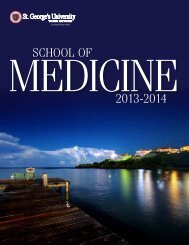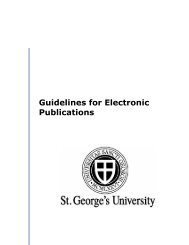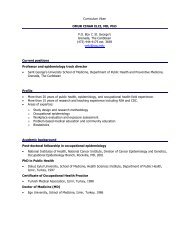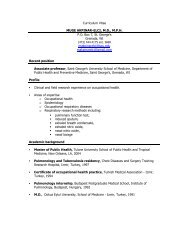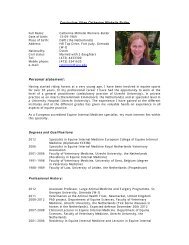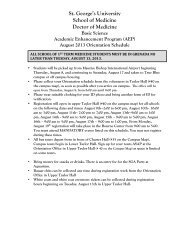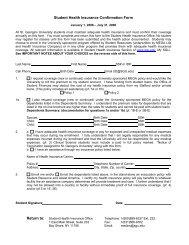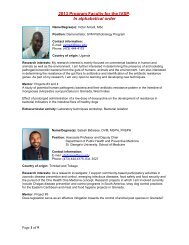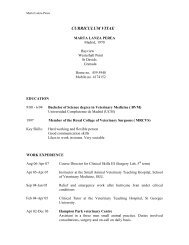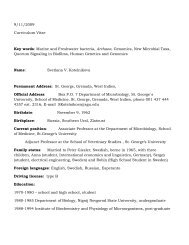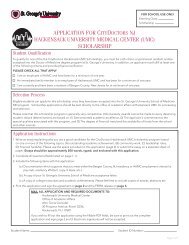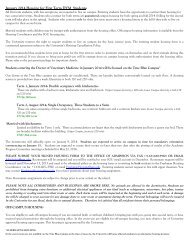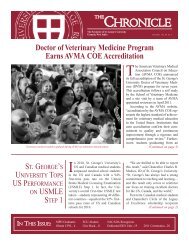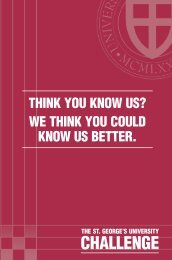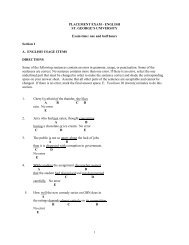SVM Catalogue 2012-2013 - St. George's University
SVM Catalogue 2012-2013 - St. George's University
SVM Catalogue 2012-2013 - St. George's University
Create successful ePaper yourself
Turn your PDF publications into a flip-book with our unique Google optimized e-Paper software.
PHyS 202<br />
General Physics II<br />
This course is an introduction to basic principles of<br />
electricity, magnetism, electromagnetism, alternating<br />
current, electric fields, and optics. This course is a<br />
noncalculus course.<br />
PMeD 301<br />
Learning <strong>St</strong>rategies for Preprofessionals<br />
This is a skills development course through which students<br />
in the preprofessional programs find creative and<br />
constructive ways to gain and apply knowledge in learning<br />
situations. <strong>St</strong>udents develop a commitment to learning in a<br />
more personalized, efficient, and effective way. Significant<br />
attention is given to study strategies and how to best<br />
place these strategies into practice in their course of study.<br />
Class sessions provide opportunities for students to gain<br />
exposure to various learning strategies, and for students<br />
to share their experiences, successes, and concerns with<br />
other students. <strong>St</strong>udents gain exposure to various learning<br />
techniques. <strong>St</strong>udents are exposed to levels of learning,<br />
types of studying, time management and planning, active<br />
review, memory, note-taking strategies, group study, and<br />
methods of developing critical thinking skills.<br />
PSyC 201<br />
Introduction to Psychology<br />
Introduction to Psychology covers systematic and<br />
experimental approaches to understanding human<br />
behavior and cognition. The course is an in-depth<br />
introduction to the science and profession of psychology,<br />
as it will present what is known about human nature and<br />
how it reveals general principles of the functioning of the<br />
brain, individuals, and groups.<br />
SSCI 412<br />
Social Science and Medicine<br />
This course examines several aspects of medicine. First, it<br />
examines how the health care system is a social institution<br />
with norms and belief systems that may differ in other<br />
countries. Second, the doctor-patient relationship is<br />
examined and the concepts of doctor communication,<br />
patient adherence and compliance, and types of health<br />
care delivery are highlighted. Third, patients’ own behavior<br />
and how it affects their health is examined. Specifically,<br />
the course discusses stress, personality, drug use, alcohol,<br />
smoking, diet, and pain management as important factors<br />
contributing to a person’s health. As fewer people die from<br />
infectious diseases and more people die from diseases like<br />
cancer that may be prevented through a healthy lifestyle,<br />
understanding a patient’s lifestyle outside of the hospital<br />
is imperative. Overall, the course discusses health and<br />
illness within a biopsychosocial model that is replacing the<br />
biomedical model in medicine.<br />
VSCI 301<br />
Introduction to Veterinary Science and Medicine<br />
This course is for students in the third year of the<br />
preveterinary medical program and focuses on topics<br />
such as applied animal nutrition, health, and welfare. In<br />
addition, students are introduced to principles of animal<br />
handling, including restraint, and discuss case histories<br />
and physiological aspects associated with the practice of<br />
veterinary medicine.<br />
Arts and Humanities Elective<br />
<strong>St</strong>udents will select an elective from the arts and<br />
humanities courses.<br />
Social and Behavioral Science Elective<br />
<strong>St</strong>udents will select an elective from the social and<br />
behavioral science courses.<br />
Doctor of veterinary<br />
Medicine Program<br />
The four-year curriculum (courses, credit hours, lecture/<br />
laboratory hours, and course descriptions) is provided below.<br />
Year 1: Term 1 Required Courses<br />
AnPH 501<br />
Veterinary Histology and Embryology<br />
(5 cr.) (Didactic 4 cr./Laboratory 1 cr.) This course begins<br />
with the study of cell structure and progresses through<br />
the basic tissues to the study of the organ systems. The<br />
histology not only provides the microscopic study of the<br />
body but also the correlation between structure and<br />
function. Knowledge of the normal structure is necessary<br />
to understand the study of abnormal (pathology), which<br />
deals with the alteration in the structure and function of the<br />
body tissues/organs caused by the disease process. The<br />
course also includes the sequence of normal development<br />
from gametogenesis and fertilization to the establishment<br />
of body form and the development of the fetal membranes,<br />
placenta, and various organ systems. Important<br />
School of Medicine<br />
Course Descriptions<br />
School of Veterinary Medicine Catalog <strong>2013</strong>–2014 | 45



